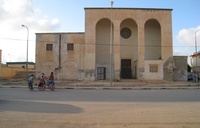OS NOVOS ASSENTAMENTOS RURAIS FUNDADOS NA LIBIA DURANTE O FASCISMO COLONIAL.

OS NOVOS ASSENTAMENTOS RURAIS FUNDADOS NA LIBIA DURANTE O FASCISMO COLONIAL. Um arquétipo de planeamento urbano, um teatro para o poder fascista ou a resposta óbvia aos requisitos urbanos locais?
by Vittoria Capresi (TUBerlin)
The lecture will focus on the newly funded rural settlements in colonial Libya, built under the Italian fascist regime.
Between 1934 and 1940 Mussolini accomplished a program of internal colonisation of the colony by realising 28 new settlements along the coast, where around 30.000 Italian farmers were dislocated.
The schemes adopted to realise those centres are following a similar pattern, where the central square, the piazza, became the focus of the design.
In which way is the piazza a design archetype? Is it possible to affirm that those villages are only a “theatre” for the fascist power? How different was the way people used those spaces from the planned one?
Vittoria Capresi
Vittoria Capresi has been senior researcher at the Habitat Unit / Chair of International Urbanism and Design at the Technical University of Berlin since October 2016, as a Principal Investigator of the International European Project MODSCAPES – Modernist Reinventions of the Rural Landspace, a fully granted HERA Project (2016-2019). Vittoria studied architecture at the University in Florence and at the Technical University in Berlin, before moving to Vienna to work as a Teaching Assistant (Wissenschaftliche Mitarbeiter) at the Vienna University of Technology’s department of History of Architecture and Building Archaeology (2002-2011). Here she achieved her PhD with a research on the Italian rural centres built in colonial Libya. From 2011 until 2014 she was appointed as Associate Professor in History of Architecture and Urban Design at the German University in Cairo – GUC, where she funded “baladilab”, a spin-off project associated to the GUC, to work with students to discover and activate the hidden potentials of urban surroundings. Her main research interests are fascist architecture and urbanism, both in Italy and in the former colonies, strategies for sharing heritage to daily users and oral history methods related to social analysis and participatory urban design.
Organização da ESAP: MIA | Mestrado Integrado em Arquitetura; CEAA | Centro de Estudos Arnaldo Araújo - Projeto MODSCAPES.
Apoio: Erasmus ESAP - TUBerlim